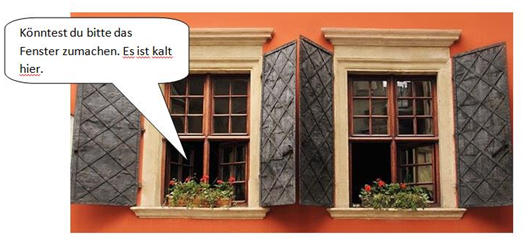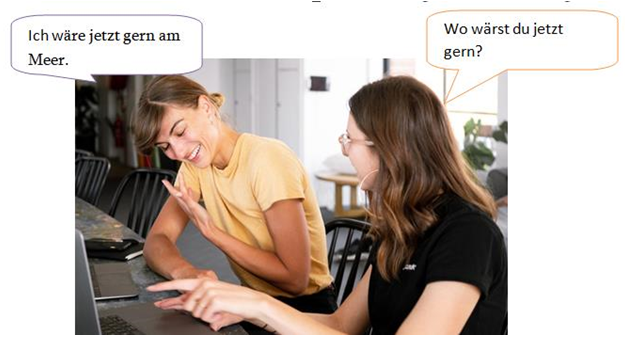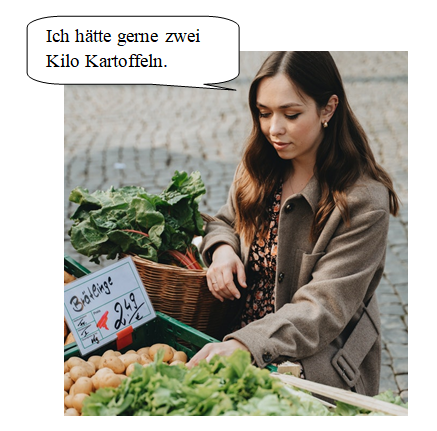These days, the subjunctive mood is fading in English. Many people try to avoid it, and some don’t even recognize it when they hear or read it. On the flip side, the subjunctive mood is pretty important in German. There are two types: the present subjunctive (subjunctive I) and the past subjunctive (subjunctive II). We will talk here about German Subjunctive II. Let’s explore how the past subjunctive conjugations are formed.
Thank you for reading this post, don't forget to subscribe!CONTENTS
Understanding the German Subjunctive
What is Subjunctive II in German?
How is Subjunctive II formed for the present?
Regular Verbs
Irregular Verbs
Mixed Verbs
How is Subjunctive II formed in the past?
Use of the Subjunctive II
Würde + Infinitive
Subjunctive II and conditional sentences
Understanding the German Subjunctive
| subjunctive I | present subjunctive perfect subjunctive future subjunctive | es gebe es habe gegeben es werde geben |
| subjunctive II | past subjunctive pluperfect subjunctive conditional | es gäbe es hätte gegeben es würde geben |
Apart from tenses (like present and past) and voices (active or passive), verbs can also change based on mood. Mood shows whether someone is stating a fact, giving a command, expressing a wish, and so on
In German and English, most verbs are in the indicative mood,used for straightforward statements. The imperative mood is what you’d use to give commands.
We will use subjunctive II when we want to describe an unrealistic situation or when we express wishes. We also use it in conditional sentences, and it can also be used in indirect speech.
For example:
Wenn ich heute Zeit hätte, käme ich ins Kino mit. – If I had time today, I’d come to the cinema with you.
Mia: ” Ich kann morgen um 20 Uhr kommen. “ – Mia: ‘ I can come tomorrow at 8 pm. ’
Mia sagte, sie könnte heute um 20 Uhr kommen. – Mia said she could come today at 8pm.
In German, the forms of the subjunctive are divided into two groups known as Subjunctive I and Subjunctive II, each with different uses.

What is Subjunctive II in German?
The subjunctive in German can be really confusing for us. Sometimes we cannot distinguish what the subjunctive actually is and when it should be used in German. Sometimes it seems to us that they use it where it shouldn’t. I hope this lesson will help you understand German subjunctive II better. The other name for the subjunctive II is past subjunctive.
The subjunctive mood suggests that the speaker thinks the statement isn’t real or is just a possibility. For instance, you might say, “If I knew he were in hospital, I would visit him.”
The subjunctive is used more frequently in German than in English and is more common in written language than in spoken language.
By using the subjunctive, German speakers can imply that what they are saying may not be real or could just be a possibility.
There are two types of subjunctive II the : for the present and for past.
Let’s see where the subjunctive II is used in the German language.
How is Subjunctive II formed for the present?
The subjunctive II is formed from the past tense conjugation of verbs.
Regular verbs
For regular verbs, the subjunctive II conjugation is the same as their indicative past tense conjugation.
In the table, you can see an example of the verb “kaufen” in both the past tense indicative and the subjunctive II. As you will notice, “kaufen” is identical in both the past tense indicative and the subjunctive II forms.
| kaufen | |
| INDICATIVE | SUBJUNCTIVE II |
| ich kaufte | ich kaufte |
| du kauftest | du kauftest |
| er kaufte | er kaufte |
| wir kauften | wir kauften |
| ihr kauftet | ihr kauftet |
| sie kauften | sie kauften |
And that’s why instead of using the usual subjunctive II form: Ich kaufte gerne ein Haus.
you should use use “würde” + Inifnitive: Ich würde gerne ein neues Haus kaufen.
Irregular Verbs
Irregular verbs are another story. The irregular past tense stem is used in the subjunctive conjugation, and the endings -e, -est, -e, -en, -et, and -en are added. You may have noticed that these are the same endings used in the present subjunctive.
Irregular past tense verbs that have an a, o, u will add an umlaut (ä,ö,ü) in this conjugation. Some examples follow:
| kommen | sprechen | beschreiben | mitgehen | bleiben | fahren |
| ich käme | ich spräche | ich beschriebe | ich ginge mit | ich bliebe | ich führe |
| du kämest | du sprächest | du beschriebest | du gingest mit | du bliebest | du führest |
| er käme | er spräche | er beschriebe | er ginge mit | er bliebe | er führe |
| wir kämen | wir sprächen | wir beschrieben | wir gingen mit | wir blieben | wir führen |
| ihr kämet | ihr sprächet | ihr beschriebet | ihr ginget mit | ihr bliebet | ihr führet |
| sie/Sie kämen | sie sprächen | sie beschrieben | sie gingen mit | sie blieben | sie führen |
And, of course, we have to isolate haben, sein, and werden for a special look.
| haben | sein | werden |
| ich hätte du hättest er,sie, es hätte wir hätten ihr hättet sie/Sie hätten | ich wäre du wärest er,sie, es wäre wir wären ihr wäret sie/Sie wären | ich würde du würdest er,sie, es würde wir würden ihr würdet sie/Sie würden |
The modal verbs in the past subjunctive look very much like their indicative past tense conjugations. However, those modals that have an umlaut in the infinitive add one in the past subjunctive.

As you can see, the modal verbs in the subjunctive II look very much like indicative past tense conjugations.. The difference is that dürfen, können, müssen and mögen get Umlaut in the subujunctive II, unlike the indicative past tense . Sollen and wollen are the same in both the indicative and subjunctive.
| dürfen | können | müssen | sollen | wollen | mögen |
| ich dürfte | ich könnte | ich müsste | ich sollte | ich wollte | ich möchte |
| du dürftest | du könntest | du müsstest | du solltest | du wolltest | du möchtest |
| er,sie,es dürfte | er,sie,es könnte | er,sie,es müsste | er,sie,es sollte | er,sie,es wollte | er,sie,es möchte |
| wir dürften | wir könnten | wir müssten | wir sollten | wir wollten | wir möchten |
| ihr dürftet | ihr könntet | ihr müsstet | ihr solltet | ihr wolltet | ihr möchtet |
| sie/Sie dürften | sie/Sie könnten | sie/Sie müssten | sie/Sie sollten | sie/Sie wollten | sie/Sie möchten |
Mixed verbs
Most irregular verbs that have a -te ending in the past tense do something special in the past subjunctive: The past tense vowel -a- is changed to -e-. or -ä- , and sLet’s compare the past indicative with the past subjunctive of this category of verbs.
| kennen Past indicative | kennen Past subjunctive | denken Past Indicative | denken Past subjunctive |
| ich kannte du kanntest er,sie, es kannte wir kannten ihr kanntet sie/Sie kannten | ich kennte du kenntest er,sie, es kennte wir kennten ihr kenntet sie/Sie kennten | ich dachte du dachtest er,sie, es dachte wir dachten ihr dachtet sie/Sie dachten | ich dächte du dächtest er,sie, es dächte wir dächten ihr dächtet sie/Sie dächten |
The verb “wissen” usually follows the conjugation rules we talked about, where you add the -te ending. But it skips using the –e– or -ä- vowel in the past subjunctive. Let’s take a closer look at this verb in both the present and past subjunctive forms.
| Present subjunctive | Past subjunctive |
| ich wisse du wissest er,sie, es wisse wir wissen ihr wisset sie/Sie wissen | ich wüsste du wüsstest er,sie, es wüsste wir wüssten ihr wüsstet sie/Sie wüssten |
Just as in the present subjunctive, the first and third person singular conjugations (ich and er) are always the same in the past subjunctive.
ich spielte er spielte (regular verb)
ich käme er käme (irregular verb with umlaut)
ich ginge er ginge (irregular verb)
ich dürfte er dürfte (modal auxiliary)
How is Subjunctive II formed in the past?
Subjunctive II for the past is formed using the auxiliary verbs “sein” or “haben” along with the Participle II. Participle II remains unchanged, while “sein” and “haben” are conjugated to match the appropriate person.
For example:
Sie sagte, sie hätte gerne ein neues Auto gekauft. – She said she would like to buy a new car.
Wir sagten, wir hätten gerne ein neues Auto gekauft. – We said we would like to buy a new car.
Ich meinte, ich wäre gerne ans Meer gefahren. – I said I would have liked to go to the sea.
Sie meinten, sie wären gerne ans Meer gefahren. – They said they would have liked to go to the seaside.
| Subjunctive II for the past | |
| machen | kommen |
| ich hätte gemacht | ich wäre gekommen |
| du hättest gemacht | du wär(e)st gekommen |
| er hätte gemacht | er wäre gekommen |
| wir hätten gemacht | wir wären gekommen |
| ihr hättet gemacht | ihr wär(e)t gekommen |
| sie hätten gemacht | sie wären gekommen |
Use of the Subjunctive II

- When we talk about wishes and dreams.
For example:
Ich wünschte, ich könnte ein freies Wochenende haben. – I wish I could have a weekend off.
Er hätte gern mehr Freizeit. – He would like to have more free time. - It can also be done with unrealistic wishes or claims. Then, of course, they are not achievable. But it can also be because they happened in the past and can no longer be changed. Such sentences are called conditional or conditional sentences.
For example:
Wenn ich Präsident wäre, hätte ich viele Angestellte. (but I’m not the president, so the wish is unrealistic)
Wenn Mia besser gelaufen wäre, hätte sie jetzt eine Medaille. (this belongs to the past, it cannot be changed) - You can also use it for unrealistic comparisons that do not correspond to reality. You assume as if something is true and then use the conjunction als ob. Here the verbs come at the end of the sentence.
For example:
Er verhält sich so, als ob er mich nicht gesehen hätte. (On se ponašatako, kao da me nije video, alizapravo me je video) - It is also used for indirect speech, when the subjunctive I cannot be used. In indirect speech, you repeat in your own words what the other person said.
For example:
„Ich habe viel zu tun.“ → Ich sage, ich hätte keine Zeit. (Instead of habe (Subjunctive I) we put hätte (SubjunctiveII)) - When you want to ask someone something in a polite way or ask for something, it would also be good to use subjunctive II.
For example:
Könnten Sie bitte die Tür zumachen? – Could you please close the door? - Ponekad ga možete koristiti i da izrazite nagađanje, iznenađenje, preporuku il isumnju.Sometimes you can also use it to express a guess, surprise, recommendation or doubt.
For example:
Er sollte jetzt schon zu Hause sein. (He should be home by now.)
Sie sollten sich mehr bewegen. (You should move more.)
Würde + Infinitive
The subjunctive II and conditional forms often mean the same thing; for example, “ich gäbe” and “ich würde geben” both mean “I would give.”
You’ll mostly see the one-word subjunctive II forms with common verbs like “wäre” (would be), “hätte” (would have), and the modal verbs.
For other verbs, especially weak ones, it’s usually better to use the conditional form with “würde” plus the infinitive, especially in spoken German.
In spoken language, würde + Infinitive is often used instead of subjunctive II. Würde is formed from the auxiliary verb werden. Here is the verb werden in subjunctive II.

For example:
Ich würde meine Wohnung heute Nachmittag aufräumen, aber ich muss arbeiten. – I would tidy up my flat this afternoon, but I have to work.
Würde + Infinitive is also used when the verb in the subjunctive II looks the same like the indicative past tense. Here is an example with the verb spielen:
Infinitive: spielen .
Indikative past tense: spielte.
Subjunctive II: spielte
The infinitive reads: spielen. Preterite indicative: spielte. Subjunctive II: spielte
For example:
→ Er meinte, er würde später Schach machen.
Today, in spoken German, würde + infinitive is increasingly used for irregular verbs.
Subjunctive II and conditional sentences
The primary function of Subjunctive II in German, both in spoken language and writing, is to express unreal or hypothetical conditions, particularly in conditional sentences that begin with “wenn” (if).
For example:
Wenn ich Zeit hätte, käme ich gern mit. – If I had time I would gladly accompany you.
Wir würden und freuen, wenn Sie uns besuchen könnten. – We would be delighted it if you could visit us.
Wenn ich im Lotto gewinnen würde, würde ich eine Villa in Italien kaufen. – If I won /were to win the jackpot, I would buy a villa in Italy.
In German, forms of Subjunctive II can be utilized in both the “if” clause and the main clause. The choice between the past subjunctive or the conditional form depends on the verb used. Generally, the past subjunctive is employed with common verbs, while the conditional form is used with less common or weak verbs.
To convey a hypothetical situation in the past, the pluperfect subjunctive is used.
For example:
Wenn wir schneller gefahren wären, hätten wir die Fähre erreicht. If we had driven faster we would, have reached the ferry.
Wenn sie den Zug verpasst hätte, hätte sie uns sicher angerufen. If she had missed the train she would, certainly have called us.
Subjunctive II demonstrates that the condition is unreal or hypothetical.
Wenn can be omitted:
Hätte ich Zeit, (so) käme ich gern mit. – If I had time, I’d love to come with you.
Wäre Rotkäppchen zu Hause geblieben, (so) hätte der Wolf es nicht gefressen. – If Little Red Riding Hood had stayed at home, the wolf would not have eaten her.
See more:


